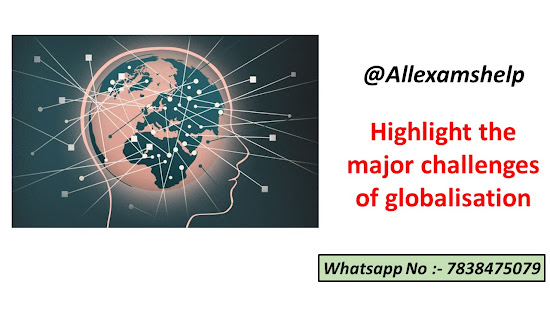Globalization, while offering many benefits such as increased economic growth and greater access to information, also poses a number of significant challenges. Some of the major challenges of globalization include.
Income
inequality: Globalization has led to a widening income gap both within and
between countries. While it has lifted many people out of poverty, it has also
concentrated wealth in the hands of a few, leaving many behind.
Highlight the major
challenges of globalisation
Job
displacement: Globalization has resulted in the relocation of many jobs from
developed countries to developing countries where labor is cheaper. This has
contributed to job losses in developed countries, especially in industries such
as manufacturing.
Environmental
degradation: Globalization has led to increased production and consumption,
leading to environmental degradation, climate change, and other ecological
problems. The lack of regulation in some countries has also led to the
exploitation of natural resources, further exacerbating these problems.
Cultural
homogenization: Globalization has led to the spread of Western culture and
values around the world, which has resulted in the loss of cultural diversity
and the homogenization of cultures. This has also led to the erosion of
traditional values and practices.
Political
instability: Globalization has resulted in increased interdependence of
countries, making them more vulnerable to economic shocks, political
instability, and other crises. This has also led to the rise of nationalism,
populism, and other forms of political extremism.
Social
dislocation: Globalization has led to the dislocation of many communities,
particularly in developing countries, where people are forced to leave their
homes and migrate to urban centers in search of work. This has led to social
dislocation and the breakdown of traditional social structures.
These
challenges require coordinated efforts by governments, international
organizations, and civil society to address them effectively. While
globalization can offer many benefits, it is important to recognize and address
these challenges in order to create a more equitable and sustainable world.
Globalization
has brought many benefits to the world, including increased economic growth,
greater access to information, and increased cultural exchange. However, it has
also presented significant challenges that must be addressed. Some of the major
challenges of globalization include:
Income
Inequality: Globalization has led to increased income inequality both within
and between countries. This has resulted in the concentration of wealth in the
hands of a few, while the majority of the world's population remains poor.
Job
Displacement: Globalization has led to the relocation of many jobs from
developed countries to developing countries where labor is cheaper. This has
resulted in job losses in developed countries, especially in industries such as
manufacturing, and has contributed to the widening income gap.
Environmental
degradation: Globalization has increased consumption and production, leading to
environmental degradation, climate change, and other ecological problems. The
lack of regulations in some countries has also led to the exploitation of
natural resources, further exacerbating these problems.
Cultural
homogenization: Globalization has led to the spread of Western culture and
values around the world, which has resulted in the loss of cultural diversity
and the homogenization of cultures. This has also led to the erosion of
traditional values and practices.
Political
Instability: Globalization has resulted in the increased interdependence of
countries, which has made them more vulnerable to economic shocks, political
instability, and other crises. This has also led to the rise of nationalism,
populism, and other forms of political extremism.
For SOLVED PDF & Handwritten
WhatsApp No :- 7838475019
Social
Dislocation: Globalization has led to the dislocation of many communities,
particularly in developing countries, where people are forced to leave their
homes and migrate to urban centers in search of work. This has led to social
dislocation and the breakdown of traditional social structures.
These
challenges are complex and interrelated, and they require coordinated efforts
by governments, international organizations, and civil society to address them
effectively.
